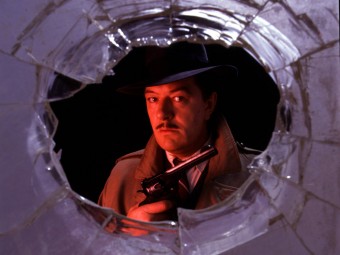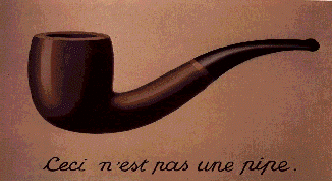May 25, 2007
Lip synch the unheimlich

Blowing a hole in the Symbolic Order...
Owen is certainly right about the uncanniness of Dennis Potter. However, far from Potter's 'strangeness of the everyday' being an unusual mode of the uncanny, this is the uncanny in itself, the familiar within the strange, the strangely familiar, the unhomely. Specifically, Owen refers to the fact that
- in The Singing Detective the real singing voice is always recorded. The eeriness of the scenes where Marlow's parents play the Ink Spots is provided by the fact that it isn't mimetic: we don't hear the sound of Alison Steadman playing the piano, but the 'original' recording in all its crackliness, echo and antiquation: the song as the boy would remember it coming out of a speaker, listening in from the stairs.
The music is not located within the diegesis, but functions to disrupt it . The ontological disjunction between the music and the drama's 'realism' is insisted upon rather than airbrushed out. The characters are not singing; they are lip synching.
The recorded music thus becomes a site through which the Real interposes itself, in at least two ways. Firstly, - and, as I argued here - the songs articulate the characters' fantasies and desires, the Real (voided) core of their being which cannot be acknowledged within the Symbolic order. The preprogrammed, recorded nature of the music is absolutely crucial to this Real, because, instead of belonging to some intimate interiority, they are part of an extimate structure. The very fact that love songs work at all presupposes this. As I suggested here, 'The jouissance of being-in-love, as we all know, is to do with becoming an automaton, you find yourself unable to resist re-citing all those corny lines - many of which are not not statements of feelings per se, but reflexive statements about what you are feeling i.e. "I’ve never felt like this before…" - but REALLY meaning them THIS time.' Here Potter is perfectly in tune with Lacan: both insist on the way in which the structure of desire sings us, turns us into ventriloquist's dummies who repeat its 'sweet nothings'.
But there is a second version of the Real at work here too - the demystifying Real. For, rather than pretending to be actually singing the songs, the actors are doing exactly what they appear to be doing: lip-synching to them. In film musicals or pop videos, lip-synching is disavowed, recording is effaced and the recorded music is naturalised by being presented as spontaneous performance. Zizek is wont to reject this 'demystifying Real', the postmodern version of the Brechtian alienation-effect, as an authentic case of the Real. In fact, he claims that such moments of postmodern demystification are in flight from the Real of fantasy and desire. But I think that Potter demonstrates that this is not always the case.
The other artist who combines the demystifying Real with the libidinal Real to explosive effect is none other than ... David Lynch. I've remarked before, and more recently here (my, this post is turning into a k-punk greatest hits!) on the affinities between Potter and Lynch. Owen is right to point up a contrast between Lynch's Weirdness and Potter's Uncanniness, yet there are zones of indiscernibility where Lynch is working on the terrain of the Potteresque uncanny. The most powerful example of this is the Club Silencio scene in Mulholland Dr. Club Silencio is both mercilessly demystifying - ‘There is no band. What you will hear are recordings’ - and in thrall to the en-trancing lure of illusion, specifically in this case to the power of the audio-illusions of pre-recorded sound. Here, surprisingly, we confront an unlikely, seemingly paradoxical composite: Surrealist-Brechtianism. Perhaps, however, Surrealist-Brechtianism is not so unprecedented, after all. What is Magritte's 'This is not a Pipe' if not an example of this strange pairing?

If lip-synching can produce uncanny effects, then so can actual singing, as trailers for Anton Corbijn's upcoming Joy Division film (see below) demonstrate. Corbijn's decision to have the actors actually learn and play the Joy Division songs looks to have been a good one. The standard technique in rock bio-pics is to have the actors lip-synch to the original band's recordings. Typically, this does not produce an interesting Lynchian/ Potteresque charge, but a botched naturalization. The songs are unconvincingly sutured to the actors' performances in the style of a bad pop video, undermining both the recordings and the diegesis. To avoid this, Corbijn would either have had to go for a Singing Detective-style alienation effect, where the gap between the actors' miming and the original recordings was played up, or else do what he ended up doing, and have the actors actually perform the songs. The latter option makes for an unsettling, eerie experience: a karaoke of doppelgangers.